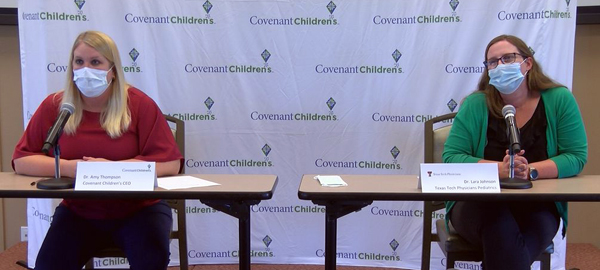LUBBOCK, Texas- Covenant Children’s Hospital held a press conference Nov. 11 with Dr. Amy Thompson and pediatric hospitalist Dr. Lara Johnson to discuss a rise in cases of Multi Inflammatory Syndrome in children (MIS-C) in Texas, stemming from previous COVID infections.
As cases of COVID-19 rise to level that healthcare workers had wished they’d never see, a local hospital in Lubbock warns families not to assume that the virus doesn’t affect children.
The press conference focused on an inflammatory condition called MIS-C. Thompson said it is a rare, but known, COVID complication.
“I just want to talk a little bit about what we have seen with COVID-19, specifically in children and adolescents,” Thompson said. “We have had a Children’s COVID Unit open here since March. What’s changed is two-fold. The first is we have seen increased admissions….of children in the COVID unit. The second is we are certainly seeing the severity of the disease. Kids that are requiring longer hospitalized stays and more support. We have reached a milestone this week in our area that candidly, I had hoped is a milestone we would never reach.”
Covenant Health said they have seen children with symptoms of MIS-C previously in the ER,
“But up until this week, those patients had not required hospitalization,” Johnson said. The hospital has had one child under 10 and one adolescent under 15 with signs and symptoms of MIS-C who were admitted and transferred to the Pediatric Intensive Care Unit.
One of those children, a third grader from Odessa, sadly passed away.
“We have two goals at this press conference. One thing is, I want us to have an opportunity to hear from an expert about what are the signs and symptoms to look for with MIS-C. We want to continue to bringing education that while this is certainly affecting our older folks in a more profound way, we are also certainly seeing the affects of this in our children and adolescents,” Thompson said.
“We want to serve as a reminder to mask, social distance, and avoid settings with large numbers of people.”
“This condition is rare, and that is one thing that is important to know. Nationally there have been around 1,160 cases or so in children, (and 20 deaths), of course that number continues to increase,” Johnson said, later adding, “We also know it is probably a condition that is under-diagnosed. It’s not unusual to not have even known the child had COVID.”
“We are still learning about it. We think it is the immune system’s response to having COVID.”
In some studies, many children diagnosed with MISC do require an intensive care unit, and it is recommended that if your child is hospitalized that you are at a hospital with an intensive care unit and those resources.”

What we see in terms of when children present is they have fever, and symptoms that are very variable. Generally involving different organ systems, at least two. What that can be is involvement with the heart, is very common, half of patients will have some type of heart impairment, it can also involve the lungs, the kidneys, the gastrointestinal system having symptoms like vomiting and diarrhea, it can involve the skin, the nervous system causing confusion….So we are talking about all kinds of systems that can be involved. There are multiple lab tests that help make the diagnosis, that show the overall inflammation in the body.”
“One of the challenges when you think about MIS-C is the CDC has a case definition and that’s what you see when we don’t know a lot about a condition. We are trying to figure out how we are going to make the diagnosis.”
“This doesn’t tend to be something we see when a child has a positive COVID test or shows some mild symptoms, it most commonly happens 2-4 weeks later. It is more of a post COVID syndrome…..I know as a parent we are hearing about some things that are certainly scary. But it’s important to recognize that MIS-C is rare and that most kids do have a good outcome, but that COVID is still something we do want to avoid. The best way to prevent MIS-C is to avoid COVID in the first place. That brings us back around to all of the things we know about following our public health guidance, which I’ll be honest with you is hard to do 9 months in.”
“I think everyone’s tired of covid, and I myself am tired of covid. All of our staff and caregivers are tired of covid….When you think about what can we do to keep myself and my family and my kids safe, we have to keep doing all the hard stuff, which is not getting together socially. Doing things remotely at a great distance and wearing your mask, and all of the things we know are helpful,” Johnson said.
In closing statements, before taking questions the hospital CEO stated, “I know this is about children. But I will also use this as a shameless plug to say, ya’ll, our adult hospitals are full. The workers are tired. We are running out of room, and once again I’d just use this opportunity to ask for compliance for all those things we know have been shown to curb the spread of COVID-19,” Thompson said.
“We talk a lot in adult care about the cytokine storm, and certainly that inflammatory cascade that we can see has some similarity, but the biggest difference is that children’s physiology is different, but really MIS-C is a post viral condition, rather than occurring in the acute phase of the infection. Sometimes we are seeing this in a child that never had a positive COVID test, (but had a positive antibody test showing previous COVID infection). Specialists across the country are trying to understand more and more about this syndrome and why it happens in some children and certainly not most children. Those are ongoing questions,” Johnson said.
“When we tend to see these cases starting is when you’ve had a lot of community spread within your region,” noting that they saw it in the New York area “many weeks into their explosion of cases.”
“It is early to say that here, but I am worried that it is fitting within that pattern,” Johnson said, adding that “Experts warn a lot about the challenges of Fall and Winter. We are driven indoors because it’s cooler, but also because of all the other viruses and conditions that we see every Winter. Our hospital is generally full with kids who have flu and RSV every winter, and now we have this overlay of COVID on top of that. So yes, I think it’s fair to say, that Winter is concerning.”
What should we look for?
“It is fever for at least a day without another explanation,” Dr. Johnson. “It is not uncommon at all to not have ever had a positive covid test,” Johnson said.
“There is a way we can acutely test for covid, and there is also a way we can test for antibodies to show that you have had the disease,” Thompson explains.
The leaders discussed that when looking at where COVID is spreading, schools are not high on that list, showing that the precautions that are being taken are effective.
“When things have been going on for a while, we tend to get used to it. We’ve become really numb to the numbers, but every one of those cases is a sick person,” Dr. Johnson adds.
“We are along way into this, and I think people are sick of this. I myself am sick of this. And could you imagine making that responsible decision when you are 10? These are some hard things..but we have to be meticulous in doing the things we know are helpful,” Thompson said.
By Kayleen Holder
Editor
